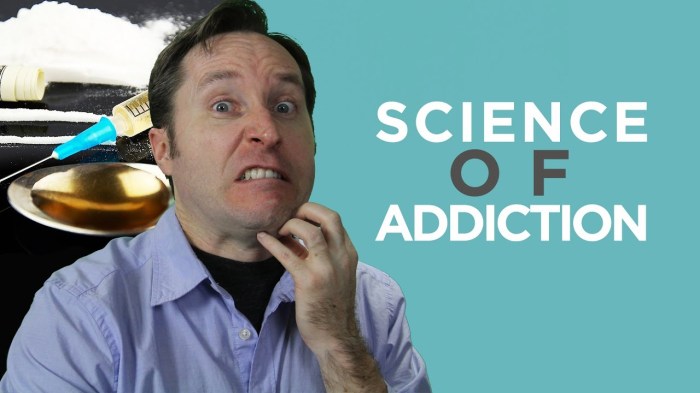The Science of Addiction Worksheet Answers provides a comprehensive exploration of the multifaceted nature of addiction. Delving into the intricate workings of the brain, the psychological underpinnings, and the profound social impact, this worksheet unveils the complexities of this prevalent issue.
Through the lens of scientific inquiry, this worksheet dissects the neurobiological mechanisms that drive addiction, unraveling the role of dopamine and the profound changes that occur within the brain’s circuitry. It delves into the interplay of genetic and environmental factors, shedding light on the intricate web of influences that contribute to the development of addiction.
The Neurobiology of Addiction
Addiction is a complex disease that affects the brain’s reward system. When someone takes drugs or alcohol, the brain releases dopamine, a neurotransmitter that produces feelings of pleasure. This positive reinforcement makes the person more likely to repeat the behavior in order to experience the pleasurable effects again.
Over time, repeated drug or alcohol use can lead to changes in the brain’s structure and function. These changes can make it difficult for the person to control their drug or alcohol use, even if they want to stop.
Genetic and Environmental Factors, The science of addiction worksheet answers
Both genetic and environmental factors can contribute to addiction. Studies have shown that people with a family history of addiction are more likely to develop the disease themselves. However, genetics are not the only factor that determines whether or not someone will become addicted.
Environmental factors, such as exposure to drugs or alcohol at a young age, can also increase the risk of addiction.
The Psychology of Addiction: The Science Of Addiction Worksheet Answers
There are a number of different psychological theories of addiction. One theory is that addiction is a form of compulsive behavior. People with addictions may feel compelled to use drugs or alcohol even when they know it is harmful to them.
Another theory is that addiction is a way of coping with stress or trauma. People who have experienced trauma may turn to drugs or alcohol to help them forget or numb the pain.
- Cognitive changes: People with addictions may have difficulty making decisions, remembering things, and concentrating.
- Emotional changes: People with addictions may experience mood swings, anxiety, and depression.
- Behavioral changes: People with addictions may neglect their responsibilities, withdraw from social activities, and engage in risky behaviors.
Stress, trauma, and mental health disorders can all increase the risk of addiction. People who are experiencing these problems may turn to drugs or alcohol to self-medicate.
The Social Impact of Addiction

Addiction has a devastating impact on individuals, families, and communities. People with addictions may lose their jobs, their homes, and their relationships. They may also experience health problems, including liver damage, heart disease, and cancer.
Addiction also has a significant economic impact. In the United States, addiction costs the economy billions of dollars each year in lost productivity and healthcare costs.
The stigma associated with addiction can make it difficult for people to get the help they need. People with addictions may be ashamed of their condition and reluctant to seek treatment.
Treatment for Addiction
There are a number of different types of treatment for addiction. The most common type of treatment is behavioral therapy. Behavioral therapy helps people to learn how to change their thoughts and behaviors that contribute to their addiction.
Other types of treatment include medication, support groups, and wilderness therapy. Medication can help to reduce cravings and withdrawal symptoms. Support groups provide a safe and supportive environment for people to share their experiences and learn from each other. Wilderness therapy helps people to get away from the triggers that can lead to relapse.
The principles of evidence-based treatment are important in addiction treatment. Evidence-based treatment is based on research that has shown to be effective in treating addiction.
Recovery from Addiction
Recovery from addiction is a long and difficult process. However, it is possible to recover from addiction and live a healthy and productive life.
The first step in recovery is to get help. This may involve going to a treatment program or seeing a therapist. Once in treatment, people will learn how to change their thoughts and behaviors that contribute to their addiction.
After treatment, people will need to continue to work on their recovery. This may involve attending support groups, seeing a therapist, and taking medication. Recovery is an ongoing process, and there will be challenges along the way. However, with hard work and dedication, it is possible to recover from addiction.
- Challenges and obstacles: People in recovery may face challenges such as cravings, triggers, and relapse.
- Support groups: Support groups provide a safe and supportive environment for people in recovery to share their experiences and learn from each other.
- Relapse prevention: Relapse prevention is an important part of recovery. People in recovery need to learn how to identify and avoid triggers that can lead to relapse.
FAQ Overview
What are the key neurobiological mechanisms involved in addiction?
Addiction involves complex neurobiological processes, primarily centered around the release of dopamine in the brain’s reward pathways. This release reinforces behaviors associated with substance use, leading to compulsive drug-seeking and use.
How does addiction impact an individual’s psychology?
Addiction can profoundly affect an individual’s psychology, leading to cognitive impairments, emotional dysregulation, and behavioral changes. It can disrupt decision-making, impair memory, and alter mood and motivation.
What are the different types of treatment available for addiction?
Treatment for addiction encompasses a range of approaches, including behavioral therapies, medication-assisted treatment, and support groups. These interventions aim to address the underlying causes of addiction, promote abstinence, and support individuals in recovery.